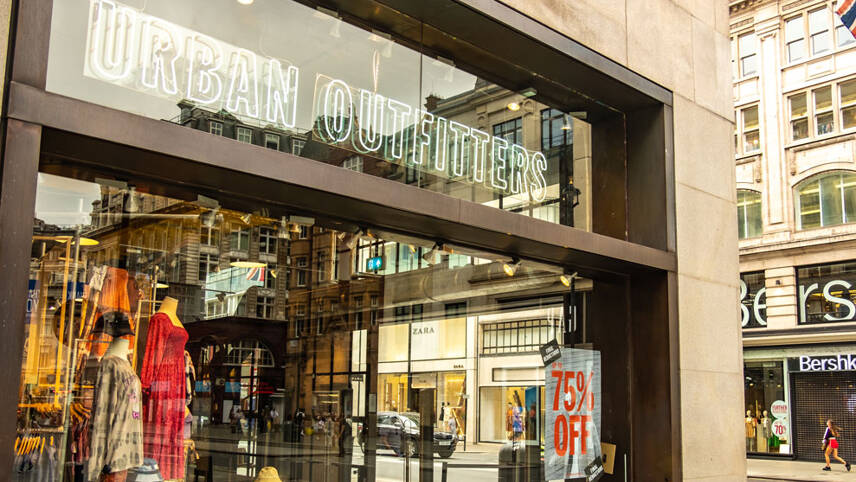Register for free and continue reading
Join our growing army of changemakers and get unlimited access to our premium content

Urban Outfitters' parent company URBN ranked in the bottom ten for its overall score.
Remake World’s Fashion Accountability report measures progress on human rights, environmental, economic and political issues embedded in fashion supply chains.
This assessment, which analysed 52 major fashion companies, including Patagonia, H&M Group, SKIMS, Ralph Lauren and Reformation, has revealed a stagnation in progress within the industry.
According to the report, the average accountability score among the assessed companies remains low, with no significant improvements observed in critical areas such as traceability, wages and wellbeing, commercial practices and sustainability governance.
Even in areas where slight progress has been made, such as raw materials procurement and environmental justice, the changes are minimal at best.
The report highlights that only 6% of companies, including H&M Group and Burberry, have met all four of Remake World’s climate demands, which include publishing full emissions data, setting short-term 1.5C -aligned science-based targets, setting long-term net-zero targets and demonstrating a reduction in total greenhouse gas (GHG) emissions compared to base years.
While a few companies have taken steps to integrate social and environmental metrics into executive bonuses, the overall pace of change remains sluggish.
According to the report, only a handful of brands, including Inditex, Kering, Nike, PUMA and Ralph Lauren, have begun addressing governance issues by including specific metrics in calculating executive bonuses.
Overproduction and waste management
Moreover, the report highlights that waste resulting from ‘fast fashion’ often ends up in landfills or incinerators, disproportionately impacting countries in the Global South such as Chile and Ghana, that simply lack the necessary resources and support to manage this waste.
Nonetheless, none of the companies assessed have yet committed to reduce or even stabilise the number of garments they produce each year, as per the report.
Climate change impact on workers
The report also emphasises that while the fashion industry acknowledges its role in reducing its GHG emissions, it has yet to accept responsibility for mitigating the effects of climate disasters on fashion-producing hubs and the garment workers who make its products.
The report notes that addressing these challenges hinges on improving commercial practices, particularly how fashion companies treat their suppliers.
Nevertheless, no company assessed currently incorporates responsible exit commitments in its contracts with suppliers, nor do they demonstrate that the prices they pay support fair wages. Additionally, only two companies, HanesBrands Inc. and MUJI, include detailed responsible sourcing timeline considerations in their order planning.
Social and environmental due diligence
In December 2023, the EU Council and Parliament agreed on a provisional agreement for a regulation that requires both EU and non-EU companies to perform environmental and human rights due diligence throughout their operations, subsidiaries and value chains.
This legislation, also known as the Corporate Sustainability Due Diligence Directive (CSDDD), would require fashion companies, alongside other industries, to proactively mitigate risks associated with their global operations, including issues like child and forced labour, pollution, emissions, deforestation, excessive water consumption and ecosystem damage.
Nevertheless, only a select few among the major companies assessed in the report, including Adidas, ASOS, H&M Group, Nike and Primark, have expressed support for the policy.
The CSDDD is due for a vote tomorrow (8 March). The European Parliament is required to approve the CSDDD by 15 March for it to be adopted before the elections.
The report urges major brands and retailers to actively support legislation and binding agreements that hold companies accountable for their human rights and environmental impacts.
It notes that without significant action from all stakeholders, achieving a more equitable and sustainable fashion industry will remain an elusive goal, perpetuating the cycle of environmental degradation and social injustice.


Please login or Register to leave a comment.